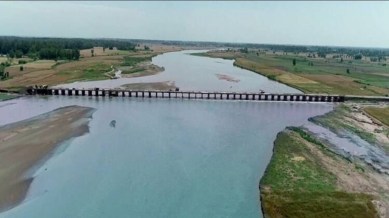Stay updated with the latest - Click here to follow us on Instagram
Multilateral treaties required for Indus, Ganga, Brahmaputra management, says report
Integrated river basin management refers to a basin-wide approach to river planning, backed by quality data sharing on water availability, biodiversity and pollution between all stakeholders.

At a time when melting glaciers, erratic rainfall pattern and flooding is affecting people in south Asia, an integrated river basin management approach for the Indus, Ganga and Brahmaputra rivers can help those living across these river basins to be resilient to climate change, reports said.
Integrated river basin management refers to a basin-wide approach to river planning, backed by quality data sharing on water availability, biodiversity and pollution between all stakeholders.
The reports have been authored by Kathmandu-based International Centre for Integrated Mountain Development (ICIMOD) and Australian Water Partnership, a body funded by the Australian government.
People in India, China, Pakistan, Afghanistan, Nepal and Bhutan depend on these three rivers for their food and water security, the study highlighted.
Even as there are bilateral treaties such as the Indus Water Treaty between India and Pakistan or agreements on water data sharing, such as the one on Brahmaputra between India and China, no multilateral agreements or treaties exist on this issue.
The report said 600 million Indians, 29 million from Nepal and millions in Bangladesh live in the Ganga river basin area. However, there is no agreement involving Nepal, India and Bangladesh. The Indus is a lifeline for 268 million people who live in its river basin whereas approximately 114 million people depend on the Brahmaputra for water, electricity, food, agriculture and fishing.
Russell Rollason from eWater — an Australian government-backed organisation— lead author on the Indus river basin report, said the report emphasises the importance of harnessing indigenous and local knowledge systems. “These hold so many insights into how local communities can act to resolve problems quickly and effectively during a crisis. Governments need to empower local communities with knowledge and technology to nurture their resilience,” said Rollason.
The reports recommended that data gaps on river basins need to be plugged for better water management, early warning and to facilitate disaster management.
There were substantial data and knowledge gaps across the Ganga river basin regarding social, economic and environmental realities and even on water usage.
Developing this data using a ‘whole basin’ research approach would yield additional benefits: data-sharing would inform more reliable water accounting, underpin strategic basin planning, increase transboundary understanding of the long-term impacts of climate change, secure more reliable water supply to all users even under uncertain conditions.
The reports also called for greater ‘hydro-solidarity’ and climate diplomacy among researchers to build trust between countries and move towards greater dialogue.